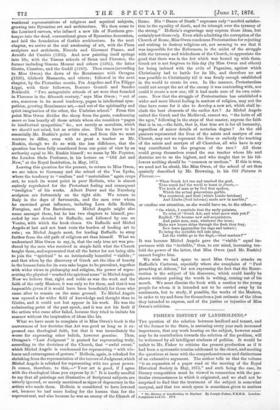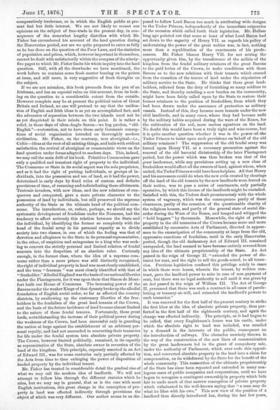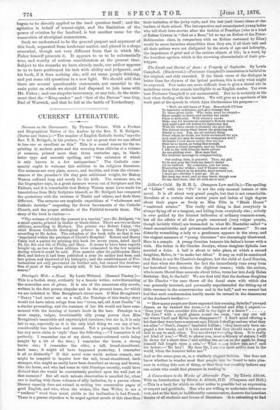FISHER'S HISTORY OF LANDHOLDING.*
THE question of the relation between landlord and tenant, and of the former to the State, is assuming every year such increased importance, that any work bearing on the subject, however small may be its contribution towards the solution of the problem, will be welcomed by all intelligent students of politics. It would be unfair to Mr. Fisher to criticise the present production as if it had been a systematic treatise addressed to the closet, and meeting the questions at issue with the comprehensiveness and distinctness of an exhaustive argument. The author tells us that the volume "is an expansion of a paper read at the meeting of the Royal Historical Society in May, 1875," and such being the case, its literary composition must be viewed in connection with the par- ticular circumstances in which it originated, and we shall not be surprised to find that the treatment of the subject is somewhat unequal, and that too much space is sometimes given to matters * The History of Landholding in England. By Joseph Fisher, F.B.131.8. London: Longrnans and Co. 1876.
.comparatively irrelevant, or in which the English public at pre- sent feel but little interest. We are not likely to recant our opinions on the subject of free-trade in the present day, in con- sequence of the somewhat lengthy diatribes with which Mr. Fisher has encumbered his account of the land question during the Hanoverian period, nor are we quite prepared to enter as fully as he has done on the question of the Poor Laws, and the statistics of population and prices, which, however important in themselves, cannot be dealt with satisfactorily within the compass of the ninety- five pages to which Mr. Fisher limits his whole inquiry into the land question. Still, with all the drawbacks we have mentioned, the work before us contains some fresh matter bearing on the points at issue, and still more, is very suggestive of fresh thoughts on the subject.
If we are not mistaken, this book proceeds from the pen of an Irishman, and has an especial value on this account, from its look- ing on the question to a considerable extent from the outside. However complete may be at present the political union of Great Britain and Ireland, no one will pretend to say that the unifica- tion of English and Irish ideas is as yet an accomplished fact, and the advocates of separation between the two islands need not be as yet disquieted in their minds on this point. It is rather a relief, in these days of ultra-Anglo-Saxon—we beg pardon, "old- English"—restoration, not to have these early Germanic concep- tions of social organisation intruded on thoroughly modern civilisation. Mr. Fisher, on the contrary, sees aboriginal—i.e., Celtic—ideas at the root of all existing things, and hails with evident satisfaction the revival of aboriginal or communistic views on the land question under forms adapted to modern days. This, indeed, we may call the main drift of his book. Primitive Communism gave only a qualified and transient right of property to the individual. The Commune or State in its social aspect was the sole proprietor, and as it had the right of putting individuals, or groups of in- dividuals, into the possession and use of land, so it had the power, determined in early days by fixed rules of custom and definite provisions of time, of resuming and redistributing these allotments. Teutonic invaders, with new ideas, and the new relations of con- querors and conquered, gave a more private character to the possession of land by individuals, but still preserved the supreme authority of the State as the ultimate head of the political com- mune. The introduction, or, rather, perhaps, we should say the systematic development of feudalism under the Normans, had the tendency to affect seriously this relation between the State and the individual, by identifying the former so completely with the head of the feudal array in his personal capacity as to divide society into two classes, in one of which the feeling was that of devotion and allegiance to the State in its personal representative, in the other, of suspicion and antagonism to a king who was seek- ing to convert the strictly personal and limited relation of feudal" suzerain into the despotism of an absolute ruler. Curiously enough, in the former class, where the idea of a supreme com- mune rather than a mere prince was still distinctly, recognised, the right of individual property in land was mostcle,arly established, and the term " freeman " was most closely identified with that of freeholder." Allodial England was the basis of our national liberties under the Plantagenet', for it was upon them that Simon de Mont- fort built our House of Commons. The increasing power of the Barons under the weaker Kings of that dynastybroke up the allodial foundation of English social order, so far as affected the country districts, by swallowing up the customary liberties of the free- holders in the feudalism of the great land tenants of the Crown, and the basis of the future incidence of land became almost limited to the nature of these feudal tenures. Fortunately, these great lords, notwithstanding the increase of their political power during the weakness of the Crown, had been successful only in guarding the nation at large against the establishment of an arbitrary per- sonal royalty, and had not succeeded in converting their tenancies for life under the feudal system into absolute private property. The Crown, however limited politically, remained, in its capacity as representative of the State, absolute owner in reversion of the land of the kingdom. This principle, expressly asserted in an Act of Edward LIL, was for some centuries only partially affected by the Acts from time to time enlarging the power of disposition of landed property by the individual tenant.
Mr. Fisher has treated in considerable detail the gradual rise of what we may call the modern idea of landlords. We will not attempt to follow him through the different statutes which he cites, but we may say in general, that as is the case with most English institutions, this great change in the conception of pro- perty in land was effected indirectly through provisions the object of which was very different. Our author seems to us dis-
posed to follow Lord Bacon too much in attributing wide designs to the Tudor Princes, independently of the immediate exigencies of the occasion which called forth their legislation. Mr. Hallam long ago pointed out that some at least of what Lord Bacon had set down to the sagacity of Henry VII. as regards his policy of undermining the power of the great nobles was, in fact, nothing more than a republication of the enactments of his prede- cessors. Mr. Fisher blames Henry VII. for not seizing the opportunity given him, by the transference of the militia of the kingdom from the feudal military retainers of the great Barons to the paid levies of the Crown, to make conditions with these Barons as to the new relations with their tenants which ensued from the cessation of the tenure of land under the stipulation of military service to the State. He thinks that these great land- holders, relieved from the duty of furnishing so many soldiers to the State, and thereby entailing a new burden on the community, might have been fairly called upon by the State to restore their former retainers to the position of freeholders, from which they had been drawn under the assurance of protection as military vassals. Instead of this, they became mere tenants under the new civil landlords, and in many cases, where they had become unfit by the military habits acquired during the wars of the Roses, for the cultivation of the soil, mere useless squatters on the land. No doubt this would have been a truly right and wise course, but it is quite another question whether it was in the power of the Tudor Princes to insist upon such provisions on behalf of the old military retainers ? The suppression of the old feudal array was forced upon Henry VII. as a necessary precaution against the renewal of the old baronial dictatorship of the later Plantagenet period, but the power which was thus broken was that of the great landowner, while any provisions setting up a new class of freeholders would affect all the owners of land, against whom, when united, the Tudor Princes would have been helpless. All that Henry and his successors could do when the new evils created by clearings off the land of the old tenants by the new landlords were forced on their notice, was to pass a series of enactments, only partially operative, by which this license of the landlords might be curtailed. Satisfied with this, the Tudors dealt promiscuously with the whole system of vagrancy, which was the consequence partly of these clearances, partly of the cessation of the questionable charity of the religious houses, and partly of the general state of social dis- order during the Wars of the Roses, and hanged and whipped the "bold beggars " by thousands. Meanwhile, the right of private property in the old tenancies of the Crown became more and more established by successive Acts of Parliament, directed in appear- ance to the emancipation of the community at large from the old, oppressive exactions of feudalism, until in the early Hanoverian period, though the old declaratory Act of Edward III. remained unrepealed, the land seemed to have become entirely severed from any idea of the ultimate proprietorship of the State. An Act passed in the reign of George II. " extended the power of dis- traint for rent, and the right to sell the goods seized, to all tenan- cies. Previous legislation confined this privilege solely to cases in which there were leases, wherein the tenant, by written con- tract, gave the landlord power to seize in case of non-payment of rent, but there was no legal authority to sell until it was given by an Act passed in the reign of William III. The Act of George II. presumed that there was such a contract in all cases of parole- letting or tenancy-at-will, and extended the landlord's powers to such tenancies."
It was reserved for the first half of the present century to strike the first blow at the idea of absolute private property, thus per- fected in the first half of the eighteenth century, and again the change was effected indirectly. The principle, as it had begun to be called, that every Englishman's house was his castle, under which the absolute right to land was included, was assailed by a demand in the interests of the public, consequent on the introduction of railways. The obstacles unwisely thrown in the way of the construction of the new lines of communication by the great landowners led to the grant of compulsory sale, under the authority of Parliament, which over-rode this opposi- tion, and converted absolute property in the land into a claim for compensation, on its withdrawal by the State for the benefit of the whole community. This reassertion of the ultimate proprietorship of the State has since been repeated and extended in many ana- logous cases of public companies and corporations, until we have begun to recognise a contingent ownership in property which bids fair to undo much of that narrow conception of private property which culminated in the well-known saying that " a man may do what he likes with his own." This new view of the position of a landlord thus directly introduced has, during the last few years, begun to be directly applied to the land question itself ; and the agitation in behalf of tenant-right, and the limitation of the power of eviction by the landlord, is but another name for the reassertion of aboriginal communism.
Such we understand to be the general purport and argument of this book, separated from irrelevant matter, and placed in a shape somewhat, though not very different from that in which Mr. Fisher himself presents it. It appears to us to be substantially true, and worthy of serious consideration at the present time. Subject to the remarks we have already made, our author appears to us to have performed his task with ability and judgment, and his book, if it does nothing else, will set some people thinking, and put some old questions in a new light. We should add that there are several questionable statements, not essential to the main point on which we should feel disposed to join issue with Mr. Fisher ; and one singular inaccuracy, at any rate, in the state- ment that the "King-maker" and "last of the Barons" was Guy, Earl of Warwick, and that he fell at the battle of Tewkesbury.




































 Previous page
Previous page